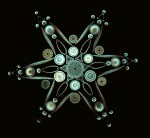We Owe Our Lives to Algae
By Dr. Norman Yan
The 2014 Muskoka Watershed Report Card was released in May and presents the results of monitoring the health of our watersheds. For the first time it includes an evaluation of algae. We normally only think about algae when they “go bad”, and because this tends to attract media attention, we might think it’s a fairly common occurrence.
When algae go bad, they often form surface blooms, blooms that are unsightly, smelly, and, at their worst, toxic, forcing us to stop drawing lake water for use at the cottage. My purpose here is to remind readers that not only do algae rarely go bad in Muskoka (under 1% of our lakes every year), but also that algae provide us with vital services.
The simple and largely unrealized truth is that we’d be stupid, hungry, and dead without algae.
Algae prosper in places where there are nutrients, moisture and light, and that is pretty well everywhere. There are hundreds of thousands of microscopic algae in every litre of healthy surface waters. Algae colonize rock faces where there is water seepage; they can colour whole fields of snow; and it’s algae that tint your bird bath red when you don’t top it up.

Victorian Diatom
However, where algae really do their work is in the open waters of the world. Every drop of surface water has algae. They come in all colours and vary enormously in size, from microscopic to giant kelp. Even in Muskoka’s lakes, algae vary in size from microscopic to 10’s of millimetres in length.
Algae are also often stunningly beautiful; Victorians used them to make art that could only be appreciated under a microscope.
But would we really be stupid, hungry and dead without them? We would, and here’s why.
Seventy percent of the earth’s surface is water and algae inhabit all of it. They are photosynthetic, using sunlight to turn carbon dioxide and water into carbohydrate and releasing free oxygen.
Take a deep breath. Now take another. That second breath is a gift of algae, because they produce roughly half of the free oxygen in the atmosphere. We’d be dead without this oxygen, dead without algae.
Without algae we’d be hungry, because the fruits of the world’s waters provide about 20% of the protein that humankind consumes. We also might be stupid since 20% of the mass of our brain is lipid, and the key lipids are omega-3 fatty acids that come from the fruits of water. Algae make omega-3 fatty acids, passing it unaltered up the food chain to the seafood that normally provides us with these essential nutrients.
Next time you look at your lake, think for a minute about algae. Without algae there would be no fish, no loons, no otters, and no frogs. In fact, it would be a lifeless swimming pool, without a food base to support life. Yes, algae can occasionally go bad, usually because we haven’t looked after the watershed. But the vast majority of the time, and in the vast majority of places in Muskoka, algae are providing us with essential services.
Past articles are available in this blog under the Watershed Notes Articles category or under Past Articles in the Resources section.
